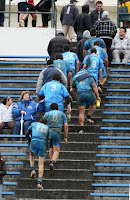Church College is the well-known Mormon secondary school at Templeview, just outside of Hamilton. The school and the community are a story well worth telling for many reasons, too many to list here. I taught there as a devoutly NON-Mormon student teacher almost ten years ago. I was overwhelmed by their fellowship, the friendship that was extended to me and also by their easy acceptance of my own beliefs. It felt good to be called “Brother” by complete strangers, students and staff alike. It was a nice departure from the more stentorian “Mr.” or “Sir”.
In spite of my devout non-mormonism, there were one or two folk who, in great humour, would test the depth of my convictions. Brother McTavish asked me if I’d like to teach full-time at the school. “Sure,” I replied “but I’m not a Mormon.” He assured me that wouldn’t be a problem. “When do you want to get baptised? I’ll put the call in.” Knowing that the school preferred it’s male staff members to be married men, I informed him that I was still unattached. “No worries! We’ll find you a woman, get you married, not a problem!” It was a tempting offer, but I managed to resist.
Brother Chase, the school maintenance man, was well into his seventies but with an almost supernatural youth. “I’ve been married almost fifty years boy. You marry the right woman, it’s beautiful man, beautiful, paradise! It's just like living in heaven.” And if you marry the wrong one? “Oh, marry the wrong one? You might as well go shoot yourself.”
The Church authorities in Salt Lake City Utah have since closed the school down. The buildings are still there, a little older, a little sadder, a little more-grey looking. There is a stillness around the campus, a resigned type of quiet that I don’t recall. It’s possible that I was an easy target for conversion, but even as a devout non-mormon with a deep love for coffee, I miss the place greatly and the sense of community I experienced there. I remember it with great affection.




